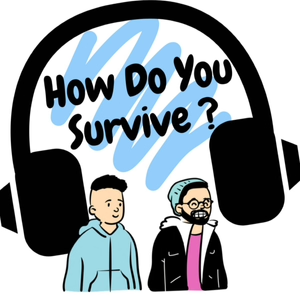
5 Ways Voice Technology Can Help with COVID-19
03/17/20 • 16 min
In this episode, Teri will talk about what’s going in the world, and specifically about the Coronavirus (COVID-19) epidemic and how voice technology could be used to help in the fight against it.
Let's Do This!
With the epidemic leading to people being told to practice social distancing, Teri has been considering how voice technology can lessen the problems people are facing with that. He will share the five different ways that he thinks voice technology can have a profound impact on what we are experiencing today with the epidemic. Some of the solutions are futuristic but they have a lot of potential going forward.
And the Five Ways Are:
#1 - Voice Enabling Diverse Gadgets
- This is voice enabling gadgets that we touch every day including kiosks, ATMs, elevator controls, and others. This is already being done today and it definitely helps with curbing the spread of the coronavirus.
#2 - A Coronavirus Flash Briefing
- This would be very beneficial in delivering accurate information about what is happening with the virus globally. Teri is launching the Coronavirus tips to keep people informed, up-to-date, and current with evidence-based, proven and good information.
#3 - General Information Skill
- Teri has already created a skill that provides general information about COVID-19 and it’s called “Coronavirus Doc” and it’s on the Alexa Skill Store. He is also working on launching it on Samsung Bixby. The skill covers information such as general info about the Coronavirus, how it’s transmitted, some of the symptoms, how to avoid contracting it, and other things.
#4 - Voice Doctor
- This is futuristic but we are already seeing hints of it. In this case, a voice assistant would act a little bit like a doctor and would ask the user questions like, “Do you have a fever? Do you have a cough? Do you have trouble breathing? Have you been exposed to someone who has the virus?”, and those sorts of questions. Then based on the responses, the voice assistant will use its algorithm to determine your risk level of having the Coronavirus. The voice assistant would then order a home test kit for you if the risk is high enough, so you could test yourself at home, and you could discuss the results with the voice assistant in such a way that you will start to obtain your medical information and care at home.
#5 - Epidemic Management
Teri believes that voice technology could help with the management of an epidemic like Coronavirus in the future through voice assistants serving as home-based healthcare providers. A great scenario is if one was diagnosed with the Coronavirus and they had a skill that would monitor how they are doing, ask them to rate their symptoms, look for patterns, and other things.
List of resources mentioned in this episode:
Other useful resources:
- Voice in Canada: The Flash Briefing
- Complete List of Alexa Commands
- Alexa-Enabled and Controlled Devices in Canada
- Teri Fisher on Twitter
- Alexa in Canada on Twitter
- Alexa in Canada Facebook Page
- Alexa in Canada Community Group on Facebook
- Alexa in Canada on Instagram
- Please leave a review on iTunes
- Shopping on Amazon.ca
Hosted on Acast. See acast.com/privacy for more information.
In this episode, Teri will talk about what’s going in the world, and specifically about the Coronavirus (COVID-19) epidemic and how voice technology could be used to help in the fight against it.
Let's Do This!
With the epidemic leading to people being told to practice social distancing, Teri has been considering how voice technology can lessen the problems people are facing with that. He will share the five different ways that he thinks voice technology can have a profound impact on what we are experiencing today with the epidemic. Some of the solutions are futuristic but they have a lot of potential going forward.
And the Five Ways Are:
#1 - Voice Enabling Diverse Gadgets
- This is voice enabling gadgets that we touch every day including kiosks, ATMs, elevator controls, and others. This is already being done today and it definitely helps with curbing the spread of the coronavirus.
#2 - A Coronavirus Flash Briefing
- This would be very beneficial in delivering accurate information about what is happening with the virus globally. Teri is launching the Coronavirus tips to keep people informed, up-to-date, and current with evidence-based, proven and good information.
#3 - General Information Skill
- Teri has already created a skill that provides general information about COVID-19 and it’s called “Coronavirus Doc” and it’s on the Alexa Skill Store. He is also working on launching it on Samsung Bixby. The skill covers information such as general info about the Coronavirus, how it’s transmitted, some of the symptoms, how to avoid contracting it, and other things.
#4 - Voice Doctor
- This is futuristic but we are already seeing hints of it. In this case, a voice assistant would act a little bit like a doctor and would ask the user questions like, “Do you have a fever? Do you have a cough? Do you have trouble breathing? Have you been exposed to someone who has the virus?”, and those sorts of questions. Then based on the responses, the voice assistant will use its algorithm to determine your risk level of having the Coronavirus. The voice assistant would then order a home test kit for you if the risk is high enough, so you could test yourself at home, and you could discuss the results with the voice assistant in such a way that you will start to obtain your medical information and care at home.
#5 - Epidemic Management
Teri believes that voice technology could help with the management of an epidemic like Coronavirus in the future through voice assistants serving as home-based healthcare providers. A great scenario is if one was diagnosed with the Coronavirus and they had a skill that would monitor how they are doing, ask them to rate their symptoms, look for patterns, and other things.
List of resources mentioned in this episode:
Other useful resources:
- Voice in Canada: The Flash Briefing
- Complete List of Alexa Commands
- Alexa-Enabled and Controlled Devices in Canada
- Teri Fisher on Twitter
- Alexa in Canada on Twitter
- Alexa in Canada Facebook Page
- Alexa in Canada Community Group on Facebook
- Alexa in Canada on Instagram
- Please leave a review on iTunes
- Shopping on Amazon.ca
Hosted on Acast. See acast.com/privacy for more information.
Previous Episode

Dr. Teri Fisher on the Artificial Podcast with Nick Myers
In this episode, Teri is welcomed by Nick Myers on the Artificial Podcast to talk about flash briefings and healthcare.
Enjoy the Conversation!
Teri is a sports exercise physician and clinical assistant professor at the University of British Columbia in Vancouver. He is the founder of Voice First Health, the leading podcast about the intersection of voice first technology and healthcare. He is also the founder of Alexa in Canada, the leading Amazon Alexa resource for Canadians. He is an award winning TEDx and keynote speaker, Amazon Alexa champion, educator, consultant, podcaster and briefcaster who loves sharing his excitement for artificial intelligence and voice first technology. He is the host of both his podcasts, and the daily Voice in Canada flash briefing, which is the number one rated Amazon Alex flash briefing and new skill in Canada.
Early Inspiration
- Teri had an interest in voice tech from a young age when he used to play with radio control cards.
- He had an interest in digital photography, video editing, audio, and music.
- He was very much involved in the creative space as he was growing up. His mother is a music therapist and she trained as a professional musician.
- She made sure Teri learned how to play the violin from age three all the way to high school. He also developed an interest in percussion instruments somewhere along the way and has been a drummer and percussionist for many years.
- As he was listening to podcasts, he heard about Amazon Alexa and he discovered that it was not in Canada.
- He started researching online for information on voice technology, but couldn’t find anything on the technology’s presence in Canada. So he thought he should combine his passion for technology, healthcare, education, and create a resource for people to learn about the technology.
The Role Being an MD Has Played
- He has a strong science formal educational background, and part of that is being able to critically look at things, synthesize information, and determine how something can help people.
- From his research, he determined that the computer science behind voice technology had some similarities to the science background that he has had.
Flash Briefings 101
- Teri thinks of them as cousins to podcasts.
- They are the prime real estate of voice because they are the easiest way for any content producer to enter into voice technology, create content, develop an intimate relationship with the audience, and become an authority in whatever area they’re passionate about.
- There are about 12,000 briefcasters compared to 700,000 podcasters, signifying that there is a tremendous opportunity in flash briefings
- Most people enjoy listening to flash briefings that are around 2 minutes in length, and they tend to be listened to during transitional moments of the day like getting ready in the morning.
- Flash briefings are easy to play. Once someone has them enabled, they just invoke the flash briefings name, and it gets much easier because they just have to say, “Play my news”
- Teri loves the fact that people are impacted by flash briefing content. He has been able to develop a community around his Voice in Canada flash briefing.
- He gets frequent feedback and reviews on his flash briefing.
- An interesting fact is that a lot of his audience is visually impaired, and that lends itself to the fact that voice technology is such an inclusive type of technology where one doesn’t have to be looking at anything to get content or initiate it.
How Teri Learned Everything About Flash Briefings
- With his formal training as a physician, he’s familiar with the constant change of information.
- It’s always the responsibility of the physician to be on top of new research and information, and he approached learning about flash briefings the same way.
- He went through a lot of the Amazon developer information and manuals that are there, and with his previous podcasting experience, he was able to start doing flash briefings.
- His background in sound, audio, and music also helped in a huge way in him creating his flash briefing.
- Amazon has made the process of developing flash briefings easier.
All About Alexa in Canada
- It’s a website and resource where people go to learn how to get more out of Alexa.
- He also highlights skills that are available in Canada.
- He also has a list of common Alexa commands, tutorials, and links to the Voice in Canada flash briefing on the website.
- He has the Flash Briefing Formula course that covers everything from how to come up with a flash briefing idea to how to launch it. It has screenshots and explainer videos.
Str...
Next Episode

Dr. Teri Fisher on the Inside Voice Podcast with Keri Roberts
In this episode, Teri is welcomed by Keri Roberts on the Inside Voice Podcast to talk about a whole host of topics around voice technology.
Enjoy the Conversation!
Teri is a sports exercise physician and clinical assistant professor at the University of British Columbia in Vancouver. He is the founder of Voice First Health, the leading podcast about the intersection of voice first technology and healthcare. He is also the founder of Alexa in Canada, the leading Amazon Alexa resource for Canadians.
He is an award winning TEDx and keynote speaker, Amazon Alexa champion, educator, consultant, podcaster and briefcaster who loves sharing his excitement for artificial intelligence and voice first technology. He is the host of both his podcasts, and the daily Voice in Canada flash briefing, which is the number one rated Amazon Alex flash briefing and new skill in Canada.
Becoming an Alexa Champion
- Teri was recently named an Alexa champion due to his last few years of content development around Amazon Alexa and voice technology in general.
- He started the Alexa in Canada podcast, Voice in Canada flash briefing, and the Voice First Health Podcast to help grow the voice technology community and get people excited about the possibilities around what Alexa can do for them and society as a whole.
- He has also helped people develop their own flash briefings through his flash briefing course.
- All his content was picked up by Amazon and they wanted to recognize him for it.
Crack the Code Gamified Flash Briefing
- It’s been a fun game that Teri has been doing and he recently did its second round.
- The first time he did it, it was as a thank you to his listeners, podcast guests, and sponsors.
- He wanted it to be a flash briefing but since flash briefings don’t allow for a two-way conversation, he created an accompanying Alexa skill, which he called Crack the Code.
- To play the game, listeners have to listen to the Voice in Canada flash briefing every day so they can hear the clue or puzzle Teri shares.
- They then have to solve the clue or puzzle and go to the Crack the Code skill, talk to Alexa, and then find out if they got the correct answer to the clue or puzzle.
- Alexa then gives them a small little piece of the final code.
- If they do that every day for the duration of the contest, then they get all the pieces to say the final code to Alexa. If they crack the code, Alexa gives them the information on how to enter to win a big prize package.
- The last Crack the Code contest went on for 10 days and Teri got a lot of great feedback from participants. Close to 900 people entered the contest and 51 actually solved the code and were given a variety of prizes.
- The contest was sponsored by AudioBurst, Trinity Audio, Treble.FM, VoiceXP, Voice Summit, and Amazon.
- The previous Crack the Code had gone on for 14 days and the feedback he got is that 14 days was a little too long.
- The contest created a voice marketing funnel for Teri because when people listened to the flash briefing and played the game, they would ultimately enter their email address which enabled Teri to build his email list.
Marketing the Flash Briefing
- When he first started his flash briefing, he had had his podcast for a few months and a bit of an audience, which helped attract listeners to the flash briefing.
- There was nothing else in Canada in terms of Alexa related content so Canadians who were interested in Alexa could quickly access his website because it ranked high on Google. That also helped build his brand.
- Earlier on, he promoted the flash briefing on his podcast and blog.
Being Influenced By Gary Vee
- Teri first heard about voice technology from Gary Vaynerchuk and Gary has been a huge influence on him.
- A lot of people in the voice technology industry are influenced by Gary Vaynerchuk.
Building a Team Around his Brand
- Teri realized that with his full time job, he needed help in doing more video content and sharing out his content on a wider scale.
- He was lucky to get a videographer and digital marketing strategist.
- He had them both with him at Project Voice to capture as much content as possible so he could produce valuable, entertaining, and educational content for the voice community.
- Distributing that content helps to build his own brand.
Sonic Branding
- As we go into the voice first era, sonic branding will be critical for every business.
- It’s all about what a brand sounds like.
- Teri recently worked with Audrey Arbeeney of Audiobrain to create his sonic branding based on his interests and character.
If you like this episode you’ll love
Episode Comments
Generate a badge
Get a badge for your website that links back to this episode
<a href="https://goodpods.com/podcasts/voice-in-canada-podcast-40251/5-ways-voice-technology-can-help-with-covid-19-1805050"> <img src="https://storage.googleapis.com/goodpods-images-bucket/badges/generic-badge-1.svg" alt="listen to 5 ways voice technology can help with covid-19 on goodpods" style="width: 225px" /> </a>
Copy




